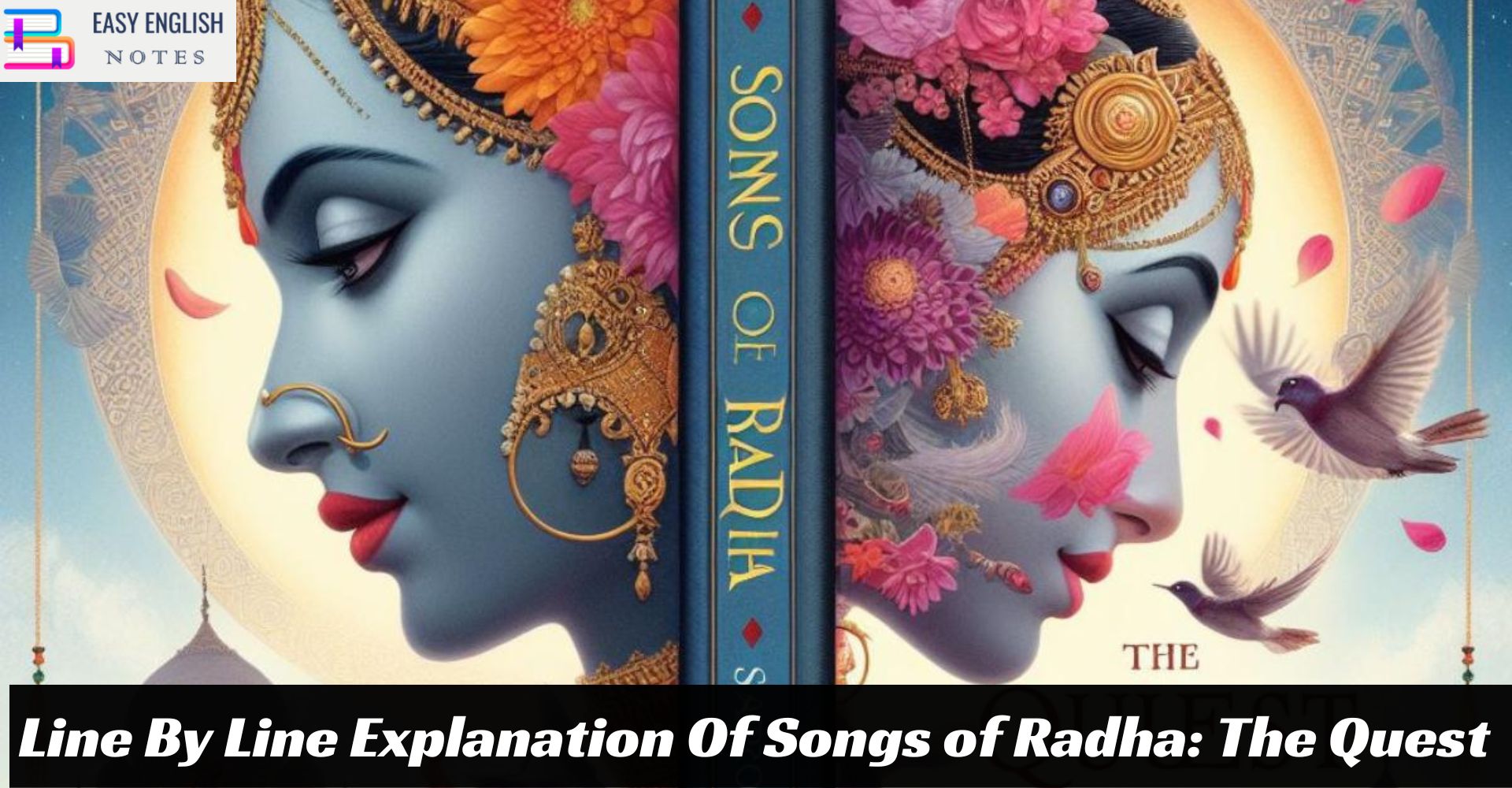Songs of Radha: The Quest
My foolish love went seeking thee at dawn,
Crying — O wind where is Kanhaya gone?I questioned at noonrise the forest glade,
Rests my sweet lover in thy friendly shade?At dusk I pleaded with the dovegray tides,
O tell me where my Flute-player abides?Dumb were the waters, dumb the woods, the wind,
They knew not where my playfellow to find.I bowed my weeping face upon my palm,
Moaning — O where art thou, my Ghanashyam?Then, like a boat that rocks from keel to rafter,
My heart was shaken by thy hidden laughter.Then didst thou mock me with thy tender malice,
Like nectar bubbling from my own heart’s chalice.Thou saidst, — O faithless one, self-slain with doubt,
Why seekest thou my loveliness without,And askest wind or wave or flowering dell
The secret that within thyself doth dwell?I am of thee, as thou of me, a part.
Sarojini Naidu
Look for me in the mirror of thy heart.
“Songs of Radha:
“The Quest” is an absolutely wonderful canvas by Sarojini Naidu of the character of Radha and her spirit in quest of Krishna, her spirit’s divine beloved. This poem tries to trace through her quest for love, longing, and an eventual realization that divinity lies within one’s self. Here, therefore, is a closer look at the poem and explanation of the lines carrying underlying meanings.
My foolish love went seeking thee at dawn, Crying — O wind where is Kanhaya gone?
Radha begins looking for the twilight—this could again be considered the very beginning of her spiritual quest. Referring to her very love for Krishna as “foolish,” it indirectly points at the innocence and purity of that love. “Kanhaya” (Krishna) is her beloved, and her calling out to the wind stands for a method by which she can speak to the wind only to find him.
I questioned at noonrise the forest glade, Rests my sweet lover in thy friendly shade?
The closer the day inches towards its forenoon zenith, so does Radha’s search increase in depth. And she does speak to the forest indeed, a place of mystery and depth, like her deeper questioning toward spiritualism. The friendly forest glade with lovely shade of trees would be an ideal comfortable place for communion with Krishna.
Google Ads PPC Training Digital – membership area
An Exclusive Blood Sugar Balancing And Weight Loss
At dusk I pleaded with the dovegray tides, O tell me where my Flute-player abides?
Until dusk, where she finds herself amidst the “dovegray tides,” the shifting, uncertain waters reflect not only her despair but also the unmovable object that has become her persistent quest. Another name for Krishna is “The Flute-player,” which means he is a participant in the bringing of divine music and joy.
Dumb were the waters, dumb the woods, the wind, They knew not where my playfellow to find.
Even if nature is beautiful and divine, it is deaf and unknowing. The water, wood, wind—all these elements are equally able to captain themselves as nature; all indicate this futility in the external search for answers.
I bowed my weeping face upon my palm, Moaning — O where art thou, my Ghanashyam?
This, in essence, makes Radha feel even more despaired in the underlying moment of deep sorrow and self-awareness brought in. “Ghanashyam” is just another name for Krishna, meaning “dark cloud,” and denotes yearning for one who brings refreshing rain to her soul.
Then, like a boat that rocks from keel to rafter, My heart was shaken by thy hidden laughter.
In her deepest moment of despair, Radha suddenly perceives Krishna’s presence, not outside, but emanating from within. His “hidden laughter” shakes her being, suggesting a profound spiritual awakening and the joyous realization of his omnipresence.
Then didst thou mock me with thy tender malice, Like nectar bubbling from my own heart’s chalice.
Krishna’s response is both teasing and enlightening, a “tender malice” that is actually a loving lesson. The realization that Krishna’s presence is like “nectar bubbling” from within her own heart signifies the bliss of finding the divine within oneself.
Also Read :
- Compare Hamlet with Macbeth, Othello and other Tragedies
- “The Pardoner’s Tale” is the finest tale of Chaucer
- Prologue to Canterbury Tales – (Short Ques & Ans)
- Confessional Poetry – Definition & meaning
- Line By Line Explanation Of The Poem The Eve of St. Agnes
Thou saidst, — O faithless one, self-slain with doubt, Why seekest thou my loveliness without,
Krishna gently chides Radha for her lack of faith and her external search for what lies within. Her doubts and faithlessness are seen as self-imposed barriers to recognizing his omnipresent beauty.
And askest wind or wave or flowering dell The secret that within thyself doth dwell?
Krishna points out the irony in asking the elements of nature for guidance when the ultimate truth of his presence lies within Radha herself, suggesting that the divine essence we seek externally is actually inherent within us.
I am of thee, as thou of me, a part. Look for me in the mirror of thy heart.
The poem concludes with Krishna revealing the profound truth of their inseparable unity. He exists within Radha, just as she is a part of him, urging her to look within her own heart to find him. This final revelation speaks to the spiritual idea that the divine resides within each individual, and that self-realization is the path to divine union.
Through “The Quest,” Sarojini Naidu explores the journey from external seeking to internal discovery, emphasizing the theme that the divine, represented by Krishna, is not separate from the self but is intricately woven into the fabric of our being. This realization transforms Radha’s longing into a profound understanding of love’s omnipresent nature, a theme that resonates with the spiritual essence of human connection to the divine.











